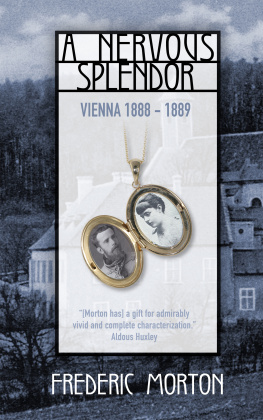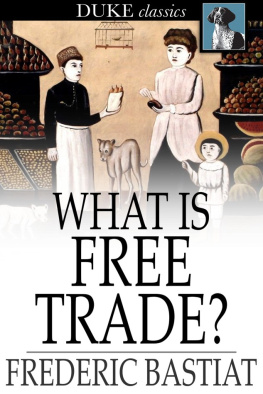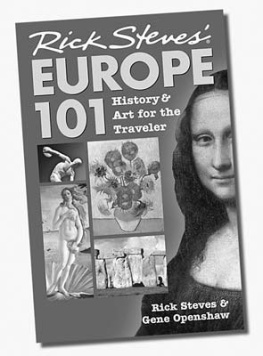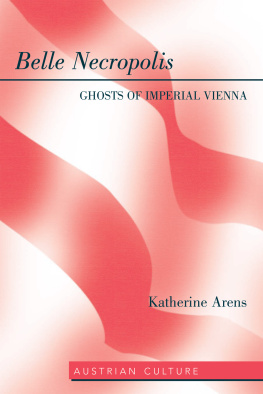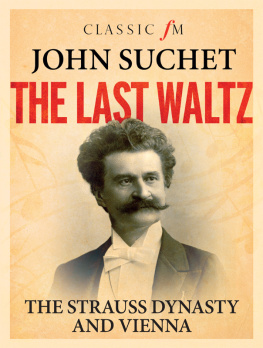A Nervous Splendor
Vienna 1888-1889
Frederic Morton
Copyright
Diversion Books
A Division of Diversion Publishing Corp.
443 Park Avenue South, Suite 1008
New York, NY 10016
www.DiversionBooks.com
Copyright 1979 by Frederic Morton
All rights reserved, including the right to reproduce this book or portions thereof in any form whatsoever.
For more information, email
First Diversion Books edition October 2014
ISBN: 978-1-62681-395-3
More from Frederic Morton
to M. C. M.
to Felicia and Lester Coleman, for so much
and to my parents, my two dearest Viennese
Preface
This book lifts a chunk out of the life of Vienna: July 1888 to April 1889. A limited spanbut to write any history is to put limits on infinity. It seemed to me that by focusing on a brief time I might expose more of its depth, its details, its dailiness. In this dailiness Ive looked for the citys pulse: small flutters no less than great poundings. Ive tried to trace local tremors that began along a curve of the Danube, then echoed across the world to come thundering down into our century.
Why just these ten months? Because they seemed representative of a watershed when the Western dream started to go wrong dramatically and the very failure was flooded with genius. It was the context and subtext of a number of events that interested meincluding, probably, one that goes unmentioned in my story. I will confess to it here.
On some morning in the fall of 1888 a twenty-three-year-old tool-and-die maker named Bernhard Mandelbaum shoved the last lathe into place in a basement in an outer district of Vienna and opened a factory to produce costume jewelry. I am Bernhard Mandelbaums grandson and the idea of that fall day gripped me as a child each time I looked at the letterhead of my fathers firm: Bernhard Mandelbaum & Sohn. Gegrndet 1888.
Founded in 1888. A phrase concealing a miracle. The factory had become no more than a fair-sized enterprise in the 1930s, but under Bernhard it had borne up very well during the Great War. Under Sohn it thrived right through the Depression. For fifty years it had been the pride, the fixed star of our family. How could my grandfather have conjured it out of nothing in 1888?
Later, in grade school, I learned that the miracle was really rather commonplace. We were taught that in Vienna the decades following 1850 were called Grnderzeit, the Time of the Founders. In that period the Emperor had built the dream-sweep of the Ringstrasse. Other Austrians, commoners or counts but giants all, had strung the railroads and raised the chimneys which hadalmostmade the baroque Empire modern.
Of course, my grandfather labored only on the fringe of that drama. Yet to me he remained a founder among founders. Later I became an American and a writer and my perspectives shifted. I saw young Bernhard Mandelbaum behind a foreground of his truly great contemporaries, the kind who create not industries but climates; men who ninety years ago brewed the very weather of our minds today, men who might have strolled past my grandfather on the sidewalks of a Vienna misted with nostalgia now, a city beyond the looking glass, shining and haunting, lilting and lost.
Do I place my grandfather in too elaborate a frame? Neither waltzer nor philosopher nor captain of cartels, he had come from Galicia to the capital to pursue an ungrandrose vision. He wanted to found with his factory a prosperous, stable, permanent place in which to be modestly dynastic. And here I am, his grandchild, looking at the Hudson instead of the Danube, writing in a language he did not know, under a name he would never recognize.
In our world, as this book tries to show, achievement must end in irony. Yet I hope that my grandfather might join the great founders of 1888 with his own small posthumous success. These pages are the seed of his seed. If he and I are lucky, they will add a little to the charting of the dark through which all of us are drifting.
F. M.
Chapter 1
On Friday, July 6, 1888, the price of sugar went up from forty to forty-two kreuzers a kilo in Imperial Vienna. On the afternoon of the same day, the gates of Franz Josephs palace swung open. A carriage swept out onto the cobbles of the Ringstrasse. Many of the strollers stopped, as though theyd been waiting for the canter of these two horses.
On the new Ringstrasse one promenaded in the hope of just such spectacles. Walking, one lingered. One came here to wait, as it were, in style. The Ringstrasse itself, all four kilometers of it, stood forever on the verge of a crescendo. Its parklike malls were flower-scented, heavy-leaved with lime and plane trees. To the left and to the right rose huge, intricately wrought silhouettes: Parliament and City Hall, the Imperial Museums, the University, the Court Opera, the Bourse, all teeming with pointed arches, towers, pillars, loggias, with vista after sculptured vista in neo-Gothic, neo-Renaissance, neo-Baroque, all quite new, barely weathered and not vet, if ever, real.
Great traditions had become mock-ups here. This was a vast stage set made of concrete, poured and molded to resemble classic stone. The architecture of previous centuries had been conjured into a theatrical dream, a mirage of portals and pediments sweeping around the medieval core of the city. A mirage waiting either to dissolve or to be touched by some great hand that would give it substance. Waiting, while the price of sugar went up.
Something had to be coming. Children might shout here or horses neigh, but the sounds always fell into a peculiar and preliminary quiet. The boulevard was such a portentous backdrop. One always looked for some act in the foreground big enough to fill it. Those vaulting facades not only glorified the Empires past but also celebrated an imminence, a transfiguring future.
Where, then, was the flesh of this future? Where the hero to animate heroic scenery? The strollers stopped and stared after the carriage. Somebody was floating away there who might justify so much splendor and so much expectation.
The carriage itself, though, was small. No herald preceded it. No guard followed. Its wheels were not painted with bands of gold. Therefore it did not belong to the coach fleet of the Imperial house. The door exhibited no escutcheon like the ones on the coaches of the aristocracy. It was just a fiacre, a private black horse cab whose cabbie held the reins. His name was Bratfisch and he was a bit more natty than most of his colleagues. He wore his mustaches longer, his cravat more artistically flowing, his top hat more fetchingly angled. And he whistled to the dancing of the hooves, the jouncing of the rubber wheels. He whistled only old Viennese songs about small, sad, dear things gone by: about the chestnut tree by the gate, the gnarled nooks of little streets, the well in the Vienna Woods; songs about the medieval walls that once had hugged the town where the Ring now displayed its glitter.
He whistled affectingly. But that wasnt why the strollers stared. After all, other horse cabbies serenaded their fares. But other cabbies had to obey traffic regulations; they were supposed to rein their horses to a walk at street crossings. Not Bratfisch. He zoomed right through, thanks to his passenger. That passenger, who hired him not for an hour or for a day but by the year, reclined in the shadow of the back seat.
He was a young, very slim man in a plain hacking jacket. His beard half concealed a narrow, taut, handsome face. A face conscious, perhaps, that it was being waited for. A young mans face become hollow from too much waiting.
Next month he would be thirty. The stupendous boulevard on which he rode had been under construction for as many years as he had lived. And it had been built for him more than for anyone else. He was the Crown Prince Rudolf, born by Gods grace to be Emperor of Austria, Apostolic King of Hungary, King of Jerusalem, King of Bohemia, King of Dalmatia, King of Transylvania, King of Croatia and Slovenia, King of Galicia and Illyria, Grand Duke of Tuscany and Cracow, Margrave of Moravia, Duke of Salzburg, Duke of Bukovina, Duke of Modena, Parma and Piacenza and Guastalla, Princely Count of Habsburg and Tyrol, Prince of Trient and Brixen, Count of Hohenembs, Grand Voyvode of Serbia, and thirty other titles, not the least echoing of which was Duke of Auschwitz.

